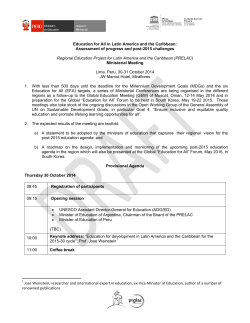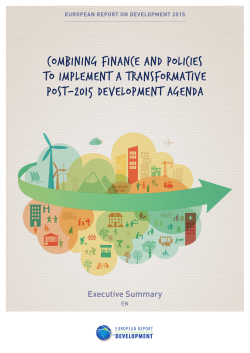
Development cooperation for people and planet: What will it take?
United Nations Department of Economic and Social Affairs Preparing for the 2016 Development Cooperation Forum Development cooperation for people and planet: What will it take? DCF High-level Symposium 8-10 April 2015, Incheon, Republic of Korea As the world prepares for the adoption of a unified and universal global development agenda to focus objectives and actions for the next 15 years, major questions remain on how to make the transition to sustainable development, leaving no-one behind. For one, what will it take, in terms of means of implementation, to deliver on the proposed Sustainable Development Goals, integrating economic, social and environmental dimensions? While building on the successes of the MDGs, new ways must be found to mobilize, allocate and use unprecedented amounts of domestic and international, public and private financial resources and other means of implementation (MOI) more effectively. Approaches to MOI coming out of the Monterrey and Rio tracks, on financing for development on sustainable development, will have to be aligned. And new efforts will be needed to secure an enabling policy environment at all levels, address systemic issues and strenghten coherence of the international monetary, financial and trading systems. All of this calls for a renewed global partnership for sustainable development, one that brings together governments, civil society and other actors to take a truly integrated approach to international development cooperation for people and planet. There is a generational opportunity, within reach, to make development cooperation a driving force that pools and optimizes certain financing and other instruments and modalities to maximize development impact on the ground, especially for the poorest and most vulnerable, and move to sustainable development pathways. In all countries, existing systems and mechanisms – from financing and budget preparation to project design and management and monitoring and reviewing progress in development cooperation – will have to adjust and align to national sustainable development strategies to make this happen. The DCF Republic of Korea Symposium will examine how development cooperation can work in practice at all levels to support the transition to sustainable development, for people and planet. It will contribute to practical efforts by all stakeholders to prepare for implementation of a post2015 development agenda, as well as to the global discussions in the run-up to the Third International Conference on Financing for Development in Addis Ababa on 13-16 July 2015 and the post-2015 Summit in New York on 25-27 September 2015. 1 Symposium Programme CO-CHAIRS: Wu Hongbo, Under-Secretary-General for Economic and Social Affairs, UNDESA, and Secretary-General for the Third International Conference on Financing for Development Yun Byung-se, Minister of Foreign Affairs, Republic of Korea THURSDAY, 9 APRIL 2015 REGISTRATION AND COFFEE 7:30 am – 8:45 am LOCATION TBC Registration of Participants and Coffee (Registration will also be open on 8 April from 8:00 am to 7:00 pm.) OPENING PLENARY SESSION 9:00 am – 9:45 am ALL PLENARY SESSIONS WILL BE HELD IN THE PREMIER BALL ROOM A+B Official Opening Yun Byung-se, Minister of Foreign Affairs, Republic of Korea Preparing for a unified and universal agenda: ECOSOC and the Development Cooperation Forum Martin Sajdik, President of the Economic and Social Council, United Nations Expectations for the Third International Conference on Financing for Development (FFD-III) George Talbot, Co-Chair, Third International Conference on Financing for Development, Permanent Representative of Guyana to the United Nations (tbc) Expectations for the DCF Republic of Korea Symposium Wu Hongbo, Under-Secretary-General for Economic and Social Affairs, UNDESA, Secretary-General for the Third International Conference on Financing for Development Introductory remarks by moderators and discussion guidelines Melinda Crane, Chief Political Correspondent, Deutsche Welle, and Henry Bonsu, International Broadcaster (United Kingdom & Ghana) SESSION I. 9:45 am – 1:00 pm PREPARING FOR A POST-2015 DEVELOPMENT AGENDA - ALIGNING COMMITMENTS ON FINANCING AND OTHER MEANS OF IMPLEMENTATION Objective: Realizing a people-centred and planet-sensitive post-2015 development agenda will require a massive injection of resources through a variety of means, as well as a coherent approach to commitments on financing and other means of implementation emerging from the Monterrey and Rio processes, including on climate financing. This session will explore the rationale for and conceptual and practical challenges to aligning 2 different approaches to financing and other means of implementation - such as capacity building, technology transfer and policy change. Participants will share their experiences in developing solutions that can inform the Financing for Development and post-2015 negotiations, as well efforts by all stakeholders to prepare for development cooperation in a post-2015 setting. Chair: Wu Hongbo, Under-Secretary-General for Economic and Social Affairs, UNDESA, Secretary-General for the Third International Conference on Financing for Development Moderator: Melinda Crane, Chief Political Correspondent, Deutsche Welle 9:45 am - 11:15 am PART I: TOWARDS MORE COHERENT SUPPORT FOR A POST-2015 DEVELOPMENT AGENDA Focus questions: 1. Why do we need to align approaches to financing and other means of implementation (MOI) associated with the Monterrey and Rio tracks? 2. What are the major conceptual and practical challenges to aligning these MOI approaches so as to better support a post-2015 development agenda? 3. What are concrete suggestions for achieving such alignment at the global level, within a single global partnership for sustainable development? PRESENTATION OF DCF STUDY “Preparing for a post-2015 development agenda - the need for a coherent approach to commitments on financing and other means of implementation coming out of Rio and Monterrey tracks" Prof. Tariq Banuri, Professor, University of Utah. INTERACTIVE PANEL DISCUSSION 11:15 am - 11:30 am COFFEE BREAK Coffee will be served in the lobby of Premier Ball Room. 11:30 am - 1:00 pm PART II: ALIGNING MOI APPROACHES IN PRACTICE AT COUNTRY LEVEL Focus questions: 1. How will national policies and institutions have to be adapted to support the alignment of development cooperation commitments on financing and other MOIs? 2. What changes are needed in terms of development cooperation operations at country level to support a coherent approach to implementing an integrated development agenda post-2015? 3. What is needed to ensure effective monitoring and reporting of financial and non-financial development cooperation commitments and results at country level? 4. What are lessons from the private capital market to support sustainable development and what role does international public finance play in this regard? INTERACTIVE PANEL AND TABLE DISCUSSIONS 3 LUNCH BREAK 1:00 pm – 2:30 pm Lunch will be provided in the Premier Ball Room. SESSION II. IMPLICATIONS OF A UNIVERSAL DEVELOPMENT AGENDA FOR THE POLICIES AND PRACTICES OF DEVELOPMENT COOPERATION POST-2015 2:30 pm – 4:00 pm Objective: A truly transformative development agenda has to be both universal and (PREMIER BALL ROOM adaptable to the conditions of each country, placing people and planet at the centre when addressing today's global development challenges. This common A+B) understanding has led to a marked shift in the focus of the global development agenda, with greater emphasis on reducing inequalities, addressing drivers of climate change, and renewing global solidarity in all its dimensions. This session explores the implications for international development cooperation to support implementation of such an agenda, including the opportunities and challenges for all countries and development cooperation actors to change. Focus questions: 1. What impact does a universally applicable development agenda have on international development cooperation -- its narrative, mandates and principles of engagement? 2. How could universality entail a different kind of engagement in the global partnership for sustainable development, strengthening mutual reviews and support for progress? 3. What can be learned from experience so far in utilising multi-stakeholder partnerships to support implementation of universal commitments? 4. For private actors engaged in development cooperation at country level, what new challenges and opportunities arise with a universal agenda? Chair: Shin Dong-ik, Deputy Minister for Multilateral and Global Affairs, Ministry of Foreign Affairs, Republic of Korea Moderator: Henry Bonsu, International Broadcaster (United Kingdom & Ghana) INTERACTIVE PANEL DISCUSSION COFFEE BREAK 4:00 pm – 4:30 pm Coffee will be served in the lobby of Premier Ball Room. DCF WORKSHOPS ON DEVELOPMENT COOPERATION POST-2015 4:30 pm – 6:00 pm Objective: Participants reconvene in two separate thematic workshops to generate specific ideas and develop concrete policy recommendations. Format: Participants will sign up in advance for one of two workshop themes. 4 Each of the two themes will be discussed in parallel in two separate workshops. The total of parallel workshops is four. Each workshop will be guided by one facilitator, who will introduce the theme and engage participants in a freeflowing debate. Concrete policy recommendations generated by the workshops will be presented during Session III on Friday morning. IN ROOM 113 (GROUP 1) AND 114 (GROUP 2) IN ROOM 115 (GROUP 3) AND 116 (GROUP 4) WORKSHOP 1 (Groups 1 and 2): TECHNOLOGY FACILITATION AND CAPACITY BUILDING Despite major advances, technology and capacity gaps persist in many countries, in both private and public sectors. International development cooperation can be expected to address these challenges as a matter of priority in the post-2015 setting, in order to help countries to "catch up" and enable social and economic transformations through technology facilitation and capacity building, This workshop will begin to explore how technology facilitation and capacity building can support implementation of a post2015 development agenda, making full use of existing facilitation and review activities and mechanisms that are already in place. WORKSHOP 2 (Groups 3 and 4): STRENGTHENING THE IMPACT OF DIFFERENT DEVELOPMENT COOPERATION MODALITIES POST-2015 A complex combination of development cooperation policies and complimentary means of support will be needed to implement the post-2015 development agenda. Each modality - ranging from official financial transfers such as grants and loans to capacity development, private transfers and blended modalities - has particularities in the way it is provided or in the effects it generates. This workshop explores different dimensions of their quality and functionality, the advantages and weaknesses of various modalities as means for supporting the post-2015 development agenda. Reiterating existing commitments, it will place special emphasis on how different modalities can be used together to promote long-term results and positive impact on policy coherence for development. It aims to collect key policy recommendations in this area and explore data and information needs, as well as support effective monitoring and review of financing and other MOI. DINNER 6:15 pm – 8:00 pm Dinner will be served in the back of the Premier Ball Room. 5 FRIDAY, 10 APRIL 2015 SESSION III. DEVELOPMENT COOPERATION POST-2015 - KEY TAKEAWAYS FROM DAY 1 9:00 am – 10:30 am Objective: Participants will convene in plenary for a resumé of workshop results and impressions from the first day. (PREMIER BALL ROOM A+B) Chair: Martin Sajdik, President of the Economic and Social Council, United Nations Moderator: Melinda Crane, Chief Political Correspondent, Deutsche Welle Focus questions: 1. How could commitments on financing and other means of implementation from the Monterrey and Rio processes be best aligned to achieve better development results? 2. What are the implications of a universal development agenda for the policies and practices of different development cooperation actors? 3. How can technology facilitation and capacity building be geared to fully support implementation of a post-2015 development agenda? 4. What are the key lessons learned as to how the impact of different modalities of development cooperation can be strengthened in order to enhance longlasting development results in all dimensions of post-2015 global development? INTERACTIVE PANEL DISCUSSION COFFEE BREAK 10:30 am – 11:00 am Coffee will be served in the lobby of Premier Ball Room. SESSION IV. IMPROVING ODA ALLOCATION FOR A POST-2015 WORLD 11:00 am – 12:30 pm Objective: ODA is the main international public resource that can be explicitly dedicated to poverty reduction and "leaving no one behind". In a post-2015 (PREMIER BALL ROOM setting, it will remain a crucial source and catalyst for other finance streams, as A+B) well as key means of implementation to support sustainable development in all its dimensions. Therefore all ODA commitments should be met. Moreover, its purpose will have to be sharpened in many contexts to match country-level needs in view of the implications of changes in development financing and other MOI. The session will examine the role that ODA can play to achieve better development results in support of the post-2015 development agenda. Focus questions: 1. What should be the place of ODA post-2015, building on its distinctive 6 characteristics and strengths? 2. How can ODA be better targeted to wherever poverty is deepest in developing countries, i.e. in politically and environmentally vulnerable countries? 3. What is needed to ensure that ODA effectively responds to the vulnerabilities of the poorest people? What could this mean for ODA allocation considerations post-2015? Chair: Oh Youngju, Director-General for Development Cooperation, Ministry of Foreign Affairs, Republic of Korea Moderator: Henry Bonsu, International Broadcaster (United Kingdom & Ghana) PRESENTATION OF DCF STUDY “Improving ODA allocation for a post-2015 world - Targeting aid to benefit the poorest 20% of people in developing countries" Judith Randel, Executive Director, Development Initiatives INTERACTIVE PANEL DISCUSSION LUNCH BREAK 12:30 pm – 2:00 pm SESSION V. Lunch will be provided in the Premier Ball Room. TO ADDIS (FFD-III) AND BEYOND 2:00 pm – 3:30 pm Objective: This concluding session will identify and summarize preceding sessions' conclusions regarding policy recommendations on a) how to align approaches to (PREMIER BALL ROOM financing and other MOI tracks; b) the features of a single renewed global partnership for sustainable development; and c) the roles of different development A+B) cooperation modalities and instruments in the post-2015 context. Through a vibrant exchange among panellists and participants, the aim is to distil key policy recommendations for the purpose of applying these in FFD-III and post-2015 negotiations; and to assist countries and other stakeholders with their preparations for implementation of a unified and universal post-2015 development agenda. Chair: Wu Hongbo, Under-Secretary-General for Economic and Social Affairs, UNDESA, Secretary-General for the Third International Conference on Financing for Development Moderators: Melinda Crane, Chief Political Correspondent, Deutsche Welle and Henry Bonsu, International Broadcaster (United Kingdom & Ghana) INTERACTIVE PANEL DISCUSSION 7 OFFICIAL CLOSING SESSION 3:30 pm – 4:00 pm (PREMIER BALL ROOM Kajara Aston Peterson, State Minister of Finance, Uganda (tbc) A+B) Martin Sajdik, President of the Economic and Social Council, United Nations Wu Hongbo, Under-Secretary-General for Economic and Social Affairs, UNDESA, Third International Conference on Financing for Development Shin Dong-ik, Deputy Minister for Multilateral and Global Affairs, Ministry of Foreign Affairs, Republic of Korea FAREWELL 4:15 pm – 6:30 pm Cultural event BACKGROUND MATERIAL DCF STUDY “Preparing for a post-2015 development agenda - the need for a coherent approach to commitments on financing and other means of implementation coming out of Rio and Monterrey tracks (forthcoming) DCF POLICY BRIEFs • “What is development cooperation?” • "Monitoring and review of development cooperation to support implementation of a post-2015 development agenda" • "Addressing changes and challenges in monitoring and review of development cooperation at the national level" • "Strengthening technology facilitation and capacity building in a post-2015 setting: understanding the issues" (forthcoming) • "Impact of Development cooperation modalities" (forthcoming) • "Improving ODA allocation for a post-2015 world" 8
© Copyright 2025













